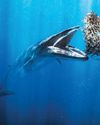
"I have always had this fascination for not only sharks, but just misunderstood predators as a whole,” Melissa Cristina Márquez tells The Week Junior Science+Nature, “Snakes, wolves, coyotes, bears… anything that has a bad reputation I’ve always been really interested in.” Márquez is a marine biologist (someone who studies life in the sea) with a particular focus on sharks. Márquez researches the areas where sharks live, and has been studying how people’s attitudes towards them affect the way they’re treated in the wild. Sometimes she’s even lucky enough to swim with these magnificent, but unappreciated, creatures.
At one with the ocean
Márquez has always felt at home in the sea. “I was born on an island and my first memories are of me being in the ocean,” she says. Not long afterwards she fell in love with sharks. Her family had just moved from Mexico to the US, and while watching TV, she stumbled upon Shark Week – a series all about these fierce fish. Márquez says she was in awe, and “that night at the dinner table, I was like, ‘I’m going to be a shark scientist’.”
It wasn’t until she was around 14 years old that Márquez had her first interaction with a shark. She was in the sea off the coast of the British Virgin Islands in the Caribbean when she spotted a nurse shark, a slow-moving shark that lives near the sea bed. Márquez remembers being so excited that she screamed. “I still feel that way every time I see a shark,” she admits, “Doesn’t matter their species, I get really, really excited. But now I just scream in my head.”
Sharky surprises
This story is from the {{IssueName}} edition of {{MagazineName}}.
Start your 7-day Magzter GOLD free trial to access thousands of curated premium stories, and 9,000+ magazines and newspapers.
Already a subscriber ? Sign In
This story is from the {{IssueName}} edition of {{MagazineName}}.
Start your 7-day Magzter GOLD free trial to access thousands of curated premium stories, and 9,000+ magazines and newspapers.
Already a subscriber? Sign In

Camera Obscura
Imagine stepping inside a dark room, where the only source of light comes through one small hole in the wall.

MANCHESTER SCIENCE FESTIVAL
From 18-27 October, shoppers at the Arndale shopping centre in Manchester, England, will face a giant spider.

Should musicians stop touring?
Multiple concerts travelling around the world have a big impact on the environment.

Are ghosts real?
Plenty of people believe in ghosts, but it's hard to find proof.

SMASH STEREOTYPES
In an extract from his prize-winning book, scientist and writer Adam Rutherford shows you how to use the power of science to fight racism. This chapter, titled Myth-Busting, is all about sport.

Animal awareness
What would it feel like to be another animal?

Hamza Yassin
Go behind the camera with a wildlife filmmaker.

WILDLIFE WATCH
Ben Hoare goes on a safari from his sofa to discover how nature documentaries are made.

Big bum breakthrough
A team of researchers who found out that mammals can breathe through their bottoms have won a prize at the lg Nobel awards.

A jaw-dropping undersea snap
A photograph of a Bryde's whale feeding on a heart-shaped \"bait ball\" of sardines has won the Ocean Photographer of the Year contest.